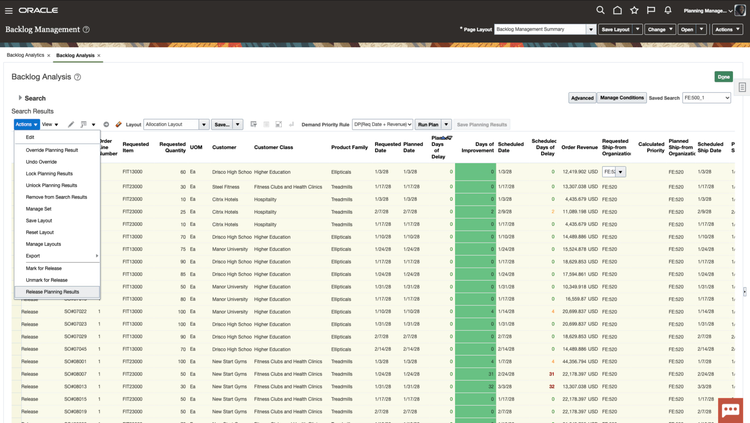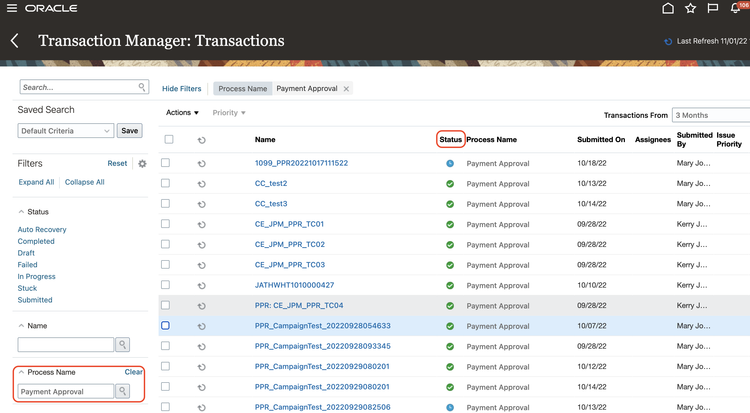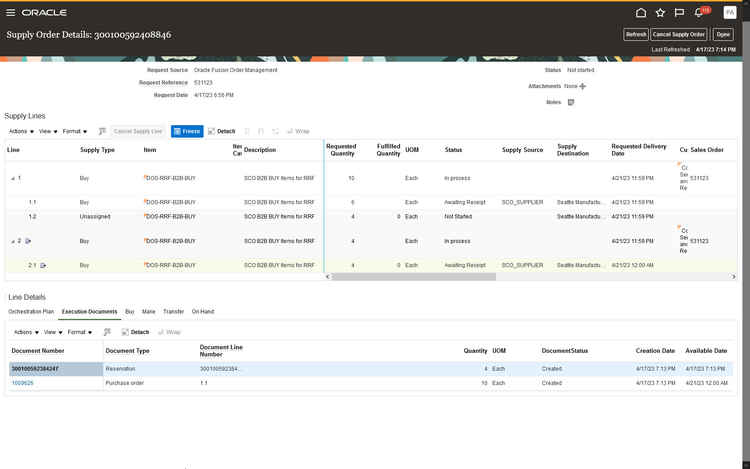What Is Oracle ERP Software?
Oracle ERP software is a SaaS suite of software applications introduced by Oracle Corporation in 2012. As an ERP software, it streamlines business operations like financial management, procurement, and project management in a central platform.
What is Oracle ERP?
Oracle Fusion Cloud ERP, sometimes referred to as Oracle Cloud ERP, is a software suite that automates core enterprise functions, like accounting and supply chain management. Founded on the Oracle Fusion Applications platform, it utilizes Oracle Fusion Architecture and Middleware. The software provides flexible deployment options, including public and private cloud hosting. It also supports hybrid configurations.
Additionally, Oracle ERP Cloud offers scalability, allowing it to grow alongside businesses as they expand and evolve. It incorporates features like AI for automating manual processes. It also harnesses machine learning insights to predict and preempt potential issues before they can damage operations.

A Brief History of Oracle ERP
Oracle Corporation, established in 1977, initially gained prominence with its relational database software. It then expanded into the ERP domain, initially with Oracle Financials, which later evolved into the Oracle E-Business Suite.
The 2000s saw Oracle amplify its offerings through key acquisitions like PeopleSoft and Siebel Systems. Recognizing the cloud’s transformative potential in the 2010s, Oracle launched its cloud-native solution, Oracle ERP Cloud. Designed with modern best practices and scalability, it offers functionalities like supply chain and project management. Today Oracle ERP Cloud stands as one of the market’s leading cloud-based platforms.
Oracle ERP Modules
The Oracle ERP Cloud suite comprises nine distinct software modules:
- Project Portfolio Management Cloud: Helps organizations manage projects efficiently, from planning to execution
- Procurement Cloud: Facilitates procurement processes, spend analysis, supplier collaboration
- Risk Management Cloud: Helps manage risks and meet compliance and privacy mandates within the ERP system
- Governance, Risk, and Compliance Cloud: Helps manage risks and meet compliance across the enterprise (not just within the ERP system)
- Supply Chain Management Cloud: Optimizes supply chain operations like procurement and order fulfillment
- Enterprise Performance Management Cloud: Helps organizations manage their financial and operational performance data
- Human Capital Management Cloud: Streamlines HR tasks like recruitment and payroll
- Customer Experience Cloud: Enhances customer interactions, sales, service
- Financials Cloud: Manages financial processes like accounting, budgeting, and reporting

Which Types of Businesses Use Oracle ERP?
Oracle ERP Cloud finds its place in companies of varying sizes, from small businesses with under 50 employees to enterprises with over 10,000. It’s adopted by sectors such as professional services, retail, government, higher education, nonprofit, banking, and healthcare. Oracle ERP software is also prevalent in industries closely aligned with software, IT solutions, and staffing and recruiting.
The following corporations use Oracle ERP:
- Lyft
- Dropbox
- goPuff
- FedEx
- Johnson Controls
- AT&T
- Skechers
- Wendy’s
- AMC
How Much Does Oracle ERP Cost?
Oracle ERP pricing covers different services with a standard three-year subscription term and a 10-user minimum requirement. The pricing is per hosted named user per month, which means you are billed monthly for each specific individual with access to the cloud-hosted software.
- Enterprise Resource Planning Cloud Service: $625
- Risk Management Cloud Service: $180
- Procurement Cloud Service: $625
- Supply Planning Cloud Service: $1,250
- Fusion ERP Analytics: $450
- Financial Reporting Compliance: $175
- Additional Financial Controls: +$80
- Access Controls: +$150
Licensing fees, implementation costs, and ongoing maintenance expenses contribute to the overall cost. Contact Oracle’s sales representatives for precise pricing details.
Advantages and Disadvantages
Advantages:
- Integration: Oracle Fusion Cloud ERP integrates with other Oracle cloud services, offering flexibility and scalability.
- Modular Flexibility: The system is modular, allowing businesses to deploy specific components as needed, prioritizing key operational areas.
- Scalability: Oracle Cloud ERP allows businesses to expand or decrease storage based on user demand, usage, and other factors, matching evolving business requirements.
- Improved compliance: The platform increases compliance with internal and external regulations. This reduces the need for customization and allows organizations to create standard processes across the organization.
- Breadth of product features: The system has a broad feature set including accounting, risk management, inventory, order management, procurement, and project management.
Disadvantages:
- Complex Implementation: Large-scale deployments can be time-consuming and complex.
- Costly: Initial investment and ongoing maintenance can be substantial. This goes especially for businesses lacking extensive IT resources or expertise.
- Learning Curve: Users may require training to harness the full potential of Oracle ERP.
- Vendor dependence: Using Oracle ERP Cloud requires reliance on a vendor for support and updates.
- Limited customization: The system has limited customization options, which may not suit companies with unique processes.

How to Implement and Upgrade
Implementing Oracle ERP involves a series of steps, including assessment, planning, configuration, testing, and deployment. Organizations often collaborate with Oracle partners or consultants to navigate the intricacies of implementation. User training is crucial to ensure efficient utilization of the system. You can learn more about this process in our article on ERP Implementation Plans.
The system updates at least twice annually. Like most software solutions, Oracle ERP Cloud undergoes periodic upgrades to enhance functionality, security, and performance.
Alternatives
While Oracle ERP Cloud is a powerful solution, businesses exploring alternatives may consider ERP systems like NetSuite, JD Edwards Enterprise One, or SAP S/4HANA.
- NetSuite is a cloud-based, developer-hosted ERP software supporting finance, operations, sales, service, and HR needs. NetSuite is best for small businesses with 10 to 50 employees, mid-market companies with 50-200 employees, and enterprises with over 10,000 employees. The company was seeded with start-up money from Oracle CEO Larry Ellison.
- JD Edwards EnterpriseOne is an ERP system with a suite of modular, industry-specific business applications. The platform runs on Oracle’s cloud, and is ideally suited for organizations that manufacture, construct, distribute, service, or manage products or physical assets.
- SAP S/4HANA is another leading ERP product in the market, known for its advanced in-memory database for real-time processing and analysis. SAP and Oracle are major competitors, and many corporations will utilize both Oracle databases and SAP applications in their IT environments.
From its inception as a pioneering database software to its evolution into a comprehensive ERP suite, Oracle has demonstrated a keen understanding of changing market dynamics. Today, its cloud ERP solution provides scalability and automates key operations, catering to diverse business needs.


















